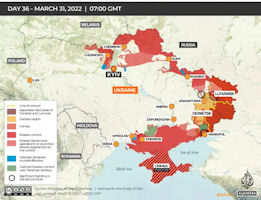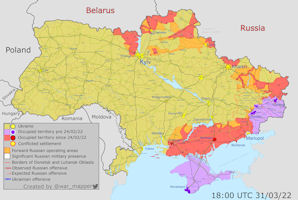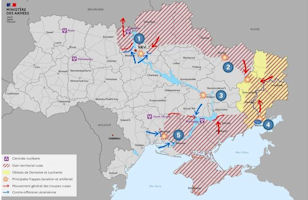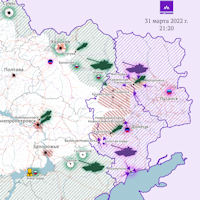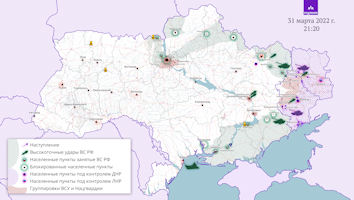Russo-Ukraine War - 31 March 2022
| Su | M | Tu | W | Th | F | Sa |
|---|---|---|---|---|---|---|
| 1 | 2 | 3 | 4 | 5 | ||
| 6 | 7 | 8 | 9 | 10 | 11 | 12 |
| 13 | 14 | 15 | 16 | 17 | 18 | 19 |
| 20 | 21 | 22 | 23 | 24 | 25 | 26 |
| 27 | 28 | 29 | 30 | 31 |
On 24 February 2022, Ukraine was suddenly and deliberately attacked by land, naval and air forces of Russia, igniting the largest European war since the Great Patriotic War. The military buildup in preceeding months makes it obvious that the unprovoked and dastardly Russian attack was deliberately planned long in advance. During the intervening time, the Russian government had deliberately sought to deceive the world by false statements and expressions of hope for continued peace.
"To initiate a war of aggression... is not only an international crime; it is the supreme international crime differing only from other war crimes in that it contains within itself the accumulated evil of the whole." [Judgment of the International Military Tribunal]
Russian President Vladimir Putin announced a "special military operation" in Ukraine in response to the appeal of the leaders of the "Donbass republics" for help. That attack is a blatant violation of the territorial integrity, sovereignty and independence of Ukraine. Putin stressed that Moscow's goal is the demilitarization and denazification of the country.
Russia has “practically destroyed” almost all of Ukraine’s defence industry, Oleksiy Arestovych, an adviser to Zelenskyy said. Arestovich underlined that any “large-scale military aggression and peace agreement are always compromises between the sides.... Because both sides suffer losses. If you think that we do not suffer losses, then you are deeply mistaken. They have practically destroyed our military industry and in many ways are finishing it off. And in many ways they are finishing off the civilian one, deliberately destroying it,” he explained. He claimed that Russia’s goal is to reduce Ukraine to a state when “no one would be interested” in it, “like a destroyed territory.” He stressed “This is exactly what they are doing and will keep doing”.
The head of one of the UK’s intelligence agencies has said that some Russian soldiers in Ukraine have refused to carry out orders, adding Putin had “misjudged” the invasion. Government Communications Headquarters (GCHQ) chief Jeremy Fleming said there was evidence that Moscow’s troops had low morale and were poorly equipped. “We’ve seen Russian soldiers – short of weapons and morale – refusing to carry out orders, sabotaging their own equipment and even accidentally shooting down their own aircraft,” he said in a speech in the Australian capital Canberra.
France's military intelligence chief left his post after Paris failed to accurately predict in contrast to other Western allies that Russia would launch a full-scale invasion of Ukraine. General Eric Vidaud, who had led the Direction of Military Intelligence (DRM) since only last summer, is to immediately step down from his post. The l'Opinion website citing an internal defence ministry investigation that criticised "insufficient briefings" and "failure to master the issues."
DRM's main role was provide intelligence on operations, and not on intentions. Its services had concluded that Russia "had the means to invade Ukraine and what happened showed that it was right," a military source said.
In the months before the invasion of Ukraine by Russian President Vladimir Putin on February 24, France's assessments had contrasted with the gloomy predictions by allies including the US and Britain who warned a major military assault was imminent. Senior figures from President Emmanuel Macron's government insisted there was no suggestion of a full-scale invasion and Macron kept diplomacy going to the last minute, meeting Putin in person in the Kremlin and trying to set up a summit with US President Joe Biden.
France's top general Thierry Burkhard admitted in an interview with Le Monde newspaper that there had been differences in the analyses between France and the US over what would happen in Ukraine. "The Americans said the Russians were going to attack and they were right," said Burkhard, who has won admirers during the conflict for his frank assessments of the situation. "Our services rather thought that the invasion of Ukraine would have a monstrous cost (for Russia) and that the Russians had other options" to achieve their goals, he said.
“It’s clear he [Putin] misjudged the resistance of the Ukrainian people. He underestimated the strength of the coalition his actions would galvanize. He underplayed the economic consequences of the sanctions regime, and he overestimated the abilities of his military to secure a rapid victory,” Fleming added. Although Putin’s advisers were believed to be too afraid to tell the truth, the “extent of these misjudgments must be crystal clear to the regime,” he said.
“We have information that Putin felt misled by the Russian military, which has resulted in persistent tension between Putin and his military leadership,” Kate Bedingfield, White House communications director, told reporters at a news briefing. “We believe Putin is being misinformed by his advisers about how badly the Russian military is performing and how the Russian economy has been crippled by sanctions because his senior advisers are too afraid to tell him the truth.”
One senior European diplomat told the Reuters news agency that the US assessment was in line with European thinking. “Putin thought things were going better than they were. That’s the problem with surrounding yourself with ‘yes men’ or only sitting with them at the end of a very long table,” the diplomat said.
South African President Cyril Ramaphosa, a potential mediator in the Russia-Ukraine conflict, has faulted NATO for triggering war in the former Soviet republic by expanding eastward onto Moscow’s doorstep. “The war could have been avoided if NATO had heeded the warnings from amongst its own leaders and officials over the years that its eastward expansion would lead to greater, not less, instability in the region,” Ramaphosa told South African lawmakers.
Biden said Putin may be “isolated” and could have placed some of his advisors under “house arrest.” “He seems to be self-isolating and there’s some indication that he has fired or put under house arrest some of his advisers. But I don’t want to put too much stock in that at this time because we don’t have that much hard evidence,” he said.
Tony Brenton, the United Kingdom’s former ambassador to Russia, says it is “likely” that Putin has not been “fully informed” on the state of Russia’s offensive by his aides. “Putin has been in withdrawal from the details of day-to-day government in Russia for the last two years, while he’s been worrying about COVID,” Brenton told Al Jazeera. “So I think the likelihood is that he’s not been fully informed on the Russian military situation,” he added. “And the subordinates around him – he has a rather limited number of people who have access to him – are almost certainly quite cautious about giving him the full details about how bad Russians are doing militarily, although he obviously knows enough that he has substantially altered Russia’s war aims.”
A senior European diplomat told Reuters that a US assessment of Putin’s advisers misleading him about the Ukraine war is in line with European thinking. “Putin thought things were going better than they were. That’s the problem with surrounding yourself with ‘yes men’,” the diplomat said.
Reuters cited two European diplomats saying Russian conscripts were told they were taking part in military exercises but had to sign for extended duty before the invasion. “They were misled, badly trained and then arrived to find old Ukrainian women who looked like their grandmothers yelling at them to go home,” one of the diplomats told the news agency.
Suggestions by U.S. officials that President Vladimir Putin’s advisers are afraid to tell him awkward truths about Russia’s military campaign in Ukraine show how little they understand him or Russia’s government, the Kremlin said. "To our regret, and, in fact, probably also to our concern, it turns out that neither the State Department nor the Pentagon have any real information about what's going on in the Kremlin. They simply don't understand what's going on in the Kremlin, they don't understand President Putin, they don't understand the mechanism for how decisions are taken, and they don't understand the style of our work," Putin’s spokesperson, Dmitry Peskov, told reporters. "This is not only a pity, but a cause for concern, because it is precisely this sort of complete misunderstanding that leads to erroneous decisions, reckless decisions which have very bad consequences," Peskov said.
The United States wants Ukraine’s borders to be respected as before the invasion was launched, Pentagon spokesperson John Kirby said. “We want Ukraine’s sovereignty, all of their sovereignty, their borders as it was before the end of February to be respected,” he told Fox News.
Britain takes a tougher stance than the United States, France and Germany on Russian-Ukrainian negotiations, recommending that Kiev not yet conclude an agreement with the Russian Federation, The Times reported, citing sources in the British government. According to them, London is concerned about the willingness of Washington, Paris and Berlin to push Ukraine to make significant concessions to the Kremlin. The authorities of the United Kingdom do not share the desire of their allies to achieve the conclusion of Russian-Ukrainian agreements in the short term, as they believe that the agreement should be signed only when Ukraine "will be in the strongest possible position."
Polish Deputy Foreign Minister Pawel Jablonski has told Al Jazeera that allowing Russia to make gains in Ukraine will encourage Moscow to adopt an aggressive stance towards eastern European countries. “Putin is not attacking other countries today because he doesn’t have adequate resources. He certainly would be willing to attack if he knew he would succeed,” Jablonski said in an interview at the Doha Forum. The official added that in recent days members of the Russian parliament discussed the “de-Nazification” of six more countries, including Poland. “If we allow Russia to win this war, they will regroup, they will resupply and they will be attacking more countries and starting more wars,” Jablonski said.
Biden said “there is no clear evidence that [Russian President Vladimir Putin] is pulling all of his forces out of Kyiv.” “I’m a little skeptical. It’s an open question whether he’s actually pulling back,” he said, adding that more troops appeared to have been sent to the Donbas area. Russian forces bombarded areas around Kyiv and Chernihiv on Wednesday, after pledging to scale back operations in those zones to promote trust between the two sides. The Pentagon has said it was not clear that Russia’s convoy of military vehicles to Kyiv, which once stretched some 60 kilometers, even exists anymore after failing to accomplish its mission. “I don’t even know if it still exists at this point… They never really accomplished their mission,” said Pentagon spokesperson John Kirby.
Zelenskyy has said he does not trust Russian promises to scale back military activity and that the Ukrainian military was getting ready for further fighting in the country’s east. “We don’t believe anyone, not a single beautiful phrase,” Zelenskyy said in a video address to the nation, adding that Russian troops were regrouping to hit the eastern Donbas region. “We will not give anything away. We will fight for every metre of our territory.”
Ukraine's president said his country's defense against the Russian invasion was at a turning point. "If we really are fighting for freedom and in defense of democracy together, then we have a right to demand help in this difficult turning point,” Zelenskyy said in his nightly video address to the nation. “Tanks, aircraft, artillery systems. Freedom should be armed no worse than tyranny."
Russian forces in Ukraine are not withdrawing but regrouping, NATO’s secretary-general said in response to Moscow’s announcements about a scaling down of military operations around Kyiv and Chernihiv. “According to our intelligence, Russian units are not withdrawing but repositioning. Russia is trying to regroup, resupply and reinforce its offensive in the Donbas region,” Jens Stoltenberg told reporters in Brussels. Russia is “regrouping” its forces in Ukraine to intensify its offensive in the country’s eastern Donetsk and Luhansk regions, Ukraine’s General Staff of Armed Forces said. “The main efforts of the enemy are focused on maintaining the occupied borders, preparing for the resumption of offensive operations in certain areas and establishing full control over the territory of Donetsk and Luhansk regions,” the department said. John Kirby, Pentagon spokesperson, said Russian private military company Wagner Group had deployed about 1,000 contractors into Ukraine’s Donbas region, which Moscow declared a priority in its offensive.
Britain and its allies have agreed to send more lethal military aid to Ukraine to help defend it against Russia's invasion, British defense minister Ben Wallace said. "A number of countries have come forward either with new ideas or indeed more pledges of money," Wallace told reporters after hosting over 35 international partners at the second International Defense Donor Conference for Ukraine (IDDCU). The aid will include the provision of air and coastal defense systems, longer-range artillery and counter battery capabilities, armored vehicles as well as wider training and logistical support.
A senior US defense official briefed reporters on the latest developments on the war in Ukraine Thursday. He said the capital Kyiv is still being targeted by Russian air and missile strikes, and that Ukrainian forces have attacked Russian forces trying to reposition. He noted that heavy fighting continued in Mariupol as Ukrainian forces put up a tough fight in the besieged southern city. He also noted that Russia’s stated focus on the Donbas region is not paying off yet, saying the Russians “have been frustrated and not successful.”
Russian troops began leaving the Chernobyl nuclear power plant after soldiers got “significant doses” of radiation from digging trenches at the highly contaminated site, Ukraine’s state power company said. Energoatom, the operator, gave no immediate details on the condition of the troops or how many were affected. But it said the Russians had dug in in the forest inside the exclusion zone around the now-closed plant, the site in 1986 of the world’s worst nuclear disaster. The troops “panicked at the first sign of illness,” which “showed up very quickly,” and began to leave, Energoatom said.
HN_Schlottman reported "Russia is likely in the process of redeploying major elements of the VDV (Russian Airborne Forces) from northwest of Kyiv to Recyca, Belarus. From Recyca, the VDV will possibly be sent to sectors in southeast Ukraine for future offensive operations in the Donbas or Izyum areas in the coming week. Russia will likely shift the overall focus of the campaign to these areas and seek to exploit limited success achieved thus far. Ukraine is continuing to mount counterattacks east of Kyiv, pushing elements of the 90th Guards Tank Division and 21st Separate Guards Motorized Rifle Brigade out of Nova Basan. In the Kharkiv area, Ukraine has likely inflicted substanial losses on the 59th Guards Tank Regiment and 138th Separate Guards Motorized Rifle Brigade." The Ministry of Defense of the Russian Federation held a briefing on Ukraine, which marked the main events by the evening of March 31 on a special military operation. This was told by the official representative of the Ministry of Defense of the Russian Federation, Major General Igor Konashenkov. During the day, operational-tactical aviation of the Russian Federation hit 28 military facilities of Ukraine. Among them: four command posts, three field depots of rocket and artillery weapons, four fuel depots and 6 areas of concentration of Ukrainian military equipment. Since the beginning of the special military operation in Ukraine, 124 aircraft and 80 helicopters and 345 unmanned aerial vehicles have been destroyed.
Air defense systems of the Russian aerospace forces shot down one Ukrainian Mi-24 helicopter in the air, as well as 4 Ukrainian UAVs; Units of the LPR troops continue offensive operations on the outskirts of Severodonetsk, having advanced 2 kilometers deep into the defense of the 57th separate motorized infantry brigade in a day; The grouping of troops of the DPR, continuing the offensive, established control over part of the settlement of Novobakhmutovka; In total, since the beginning of the special military operation, 124 aircraft and 80 helicopters, 345 UAVs and 1826 tanks have been destroyed.
Western estimates suggest Ukraine's Air Force had about 180 fixed wing aircraft and 46 helicopters at the start of the war. Naval Aviation was estimated to have about 6 fixed wing aircraft and 47 helicopters at the start of the war. Ground Forces aviation was believed to have about 60 helicopters.
The grouping of troops of the Donetsk People's Republic has established control over part of the settlement of Novobakhmutovka, is fighting with units of the 25th Ukrainian airborne brigade on the outskirts of the settlement of Novoselovka Vtoraya. During the day, over 50 militants, one tank, four infantry fighting vehicles, a field ammunition depot, as well as a tanker convoy of five vehicles were destroyed, the Russian Defense Ministry reported on the evening of March 31.
Units of the Luhansk People's Republic continue offensive operations on the outskirts of Severodonetsk, advancing 2 kilometers deep into the defense of the Ukrainian security forces in a day. This was reported on March 31 in the Ministry of Defense of the Russian Federation. More than 40 personnel of the 57th separate motorized infantry brigade of the Armed Forces of Ukraine, three infantry fighting vehicles, three vehicles for various purposes and two field depots of rocket and artillery weapons were destroyed in this direction.
“On the morning of March 31, the Kiev regime attempted to evacuate from the city of Mariupol by two Mi-8 helicopters the command staff of the Azov regiment of Ukrainian nationalists (an organization whose activities are banned in the Russian Federation). The calculation of the portable anti-aircraft missile system of the People's Militia of the Donetsk Republic from the captured American Stinger complex shot down one Ukrainian Mi-8 helicopter and crashed near the village of Rybatskoye. The second Ukrainian Mi-8 was damaged by a missile hit, evaded towards the sea, but crashed 20 kilometers from the coast, ”the Russian Ministry of Defense said on the evening of March 31.
The Ukrainian Navy deployed about 420 obsolete YaM-1 type sea anchor mines in the Black and Azov Seas from February 25 to March 4, Russian Defense Ministry spokesman Major General Igor Konashenkov said. "In the period from February 25 to March 4, in the waters of the Black and Azov Seas, the remnants of the mine-sweeping forces of the Ukrainian Navy set about 420 sea anchor mines of an outdated design of the YaM-1 type, in the Black Sea - 370 and in the Sea of Azov - 50," he said.
US State Department spokesperson Ned Price said Russian President Vladimir Putin’s demand that foreign buyers pay for Russian gas in roubles is a sign of economic and financial “desperation” caused by Western sanctions. European nations, some of which rely heavily on Russian gas, have rejected the demand and Germany’s government said it amounted to “blackmail.” A Kremlin decree, published by state media, says “unfriendly countries” can continue to pay for natural gas in foreign currency through a Russian bank that will convert the money into roubles. Germany and Austria both implemented the “early warning phase” of their emergency plans as “precautionary steps,” a European Commission spokesperson has said. No EU country has yet signalled it is facing a supply emergency, the spokesperson added. The “early warning” alert enhances a country’s monitoring of supply, requiring companies involved in the gas market to share information with authorities on a daily basis.
Russia will not do charity work if unfriendly countries refuse to buy gas for rubles. This was announced on March 31 by Russian President Vladimir Putin at a meeting to support the aviation industry. “If such payments are not made, we will consider this a default on the part of buyers. With all the ensuing consequences,” Putin said. “No one is selling us anything for free. And we are also not going to do charity work,” he said. Presidential spokesman Dmitry Peskov noted that foreign companies should understand that euros and dollars can buy rubles and pay for gas with them, de facto nothing changes. Russia will not supply it for free.
“The president will announce the largest release of oil reserves in history, putting one million additional barrels on the market per day on average – every day – for the next six months,” the White House said in a statement. “This record release will provide a historic amount of supply to serve as bridge until the end of the year when domestic production ramps up.” The US president ordered the release in a bid to control energy prices that have spiked following Russia’s invasion of Ukraine. “The bottom line is if we want lower gas prices we need to have more oil supply right now,” Biden said. “This is a moment of consequence and peril for the world, and pain at the pump for American families.”
He also invoked the Defense Production Act to encourage the mining of critical minerals for batteries in electric vehicles as part of a broader push to shift toward cleaner energy sources. The US president warned the oil industry not “to sit on record profits” during the current price surge, adding that he wanted “to lay a new foundation for true and lasting American energy independence.”
The exodus of millions of refugees from Ukraine and their desire to settle in the Czech Republic and other states could result in an "irreparable loss" for this Eastern European country, on whose territory the conflict is taking place, said former Czech President Vaclav Klaus. “We are not talking about individual migration, but about mass migration. I don’t think that we and our neighbors [in the European Union] dare to strive to “steal” millions of citizens from Ukraine,” Klaus said. residents] an irreparable loss for Ukraine?"
More than 4.05 million refugees from Ukraine arrived in neighboring countries. During the day, their number increased by almost 40 thousand, reported the Office of the UN High Commissioner for Refugees.
|
NEWSLETTER
|
| Join the GlobalSecurity.org mailing list |
|
|
|


